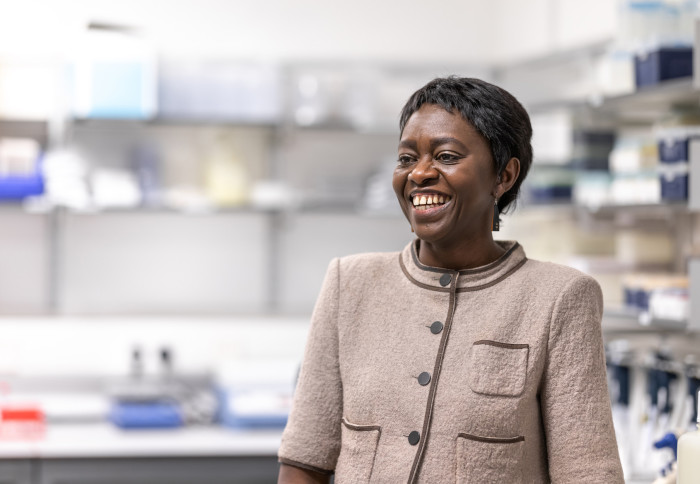Prof Faith Osier appointed Co-Director of Imperial’s Institute of Infection

Professor Faith Osier
Leading Kenyan malaria researcher Prof Faith Osier joins Imperial's Department of Life Sciences and is appointed Institute of Infection Co-Director
Professor Faith Osier has joined Imperial College London full-time from her previous role as Executive Director of the IAVI Human Immunology Laboratory. Professor Osier had been Honorary Principal Research Fellow at Imperial's Department of Infectious Disease since January 2021, and now joins the Department of Life Sciences where she will establish a new malaria research group, in addition to co-directing the College's Institute of Infection.
"I feel the urgency with dealing with these [infectious disease] problems because I have experienced them up close." Prof Faith Osier
Describing herself as ‘a paediatrician, scientist, strategist, educator, and expert communicator’, Professor Osier is a passionate advocate for Africa, its science and scientists. Having trained as a clinician at the University of Nairobi and worked extensively in Kenya through KEMRI|Wellcome Trust Research Programme, her career has also taken her to the Burnet Institute in Melbourne, Australia; University Hospital Heidelberg in Germany; and the University of Oxford.
Speaking of her own experiences of malaria—a disease that claims over half a million mostly young, African lives every year—and what motivates her work, Professor Osier said: “There are images that will never leave me. I’ve seen the impact malaria has on a family when a child has died or become permanently disabled; the impact when the clinic is jammed with people lining up the whole day to get a simple malaria test.
“I feel the urgency with dealing with these problems because I have experienced them up close. I also appreciate the good health that I have been fortunate to have, and what that has enabled me to become. How many children and families does malaria rob of a future?
“The closest comparison I can give is with COVID-19. When it hit Western countries, we all felt it: the pain of lockdown; of losing someone; of being ill ourselves. We felt that urgency, that we needed a vaccine and we needed it yesterday, so we said, ‘let's do it, let's do everything that we can’. For diseases that are far off, that sense of urgency is lost.”

Professor Alice Gast, Imperial President, said: “Professor Osier brings a vital, international perspective to our newest Global Challenge Institute. The COVID-19 pandemic highlighted the importance of global collaboration and cooperation to addressing infectious disease challenges; Faith’s wide-ranging expertise, alongside that of Co-Director Professor Charles Bangham, puts the Institute of Infection in a leadership position to improve health outcomes throughout the world.”
The Institute of Infection
Professor Osier joins Professor Bangham as Co-Director of Imperial’s Institute of Infection; launched in October 2021 to revolutionise responses to the world’s greatest challenges in infectious disease through interdisciplinary science.
Building on the Imperial’s global research expertise, the Institute of Infection unites scientists from medicine and life sciences with mathematicians, engineers, physicists and a range of other fields to work together in new ways, harnessing their combined expertise to tackle emerging and longstanding issues in infectious disease.
Speaking about her motivation to join the Institute of Infection, Professor Osier said: “I strongly believe that science is collaborative; complex challenges can be tackled when we bring the right people together. We have so much expertise; such fantastic facilities and connections at Imperial—the ingredients for big impact are here. The right spark and focus will bring these building blocks together and give our community permission to ‘think big’.”

Professor Charles Bangham said: “We are delighted to welcome Faith as the new Co-Director of the Institute of Infection. Following the recent move to Australia of our former Co-Director Professor Jake Baum, who played such a vital part in the establishment and launch of the Institute, Imperial—and the Institute in particular—are fortunate indeed that Faith, an international leader in malaria and immunology research, has joined us in this exciting and rapidly developing initiative."
Professor Ian Walmsley, Imperial Provost, said: "We are very excited to have Faith join us to help lead the new Institute of Infection at Imperial. Faith is exactly the right person to help drive our ambitions in this area. Her broad expertise in clinical medicine and life sciences embodies the strong interdisciplinary approach that is Imperial’s hallmark, and her very prominent public facing work and profile will help us deliver the innovation with major beneficial impacts on society that are critical to solving the challenges of infection worldwide.”
Research focus
In the Department of Life Sciences, Professor Osier will be establishing a group to continue her research into natural malaria immunity, in order to explore new vaccines.
Most malaria deaths are in children under five years old. The frequency of severe malaria and death decreases as children grow older because they gradually acquire immunity following repeated infections. Professor Osier is investigating this natural immunity in fine molecular detail, in order to mimic it and formulate new vaccines.
Creating vaccines for malaria is not simple, as the disease is caused by a parasite; a more complex organism than the virus that causes COVID-19 for example, and one that exists in multiple forms in different compartments of the human body.
While COVID vaccines target single proteins on the surface of the virus that are crucial for cell infection, the malaria parasite surface has many more proteins, making it is difficult to pin down which ones would stop it in its tracks. Professor Osier’s team developed a chip that enabled them to screen more than one hundred parasite proteins and prioritize the subsets that were important for immunity. They then studied human samples to understand how the body reacted to these proteins in order to overcome malaria infections.
The next steps will involve understanding how to use these parasite proteins to induce the right sets of immune responses that will stop malaria in its tracks. Her team ultimately hopes to create a vaccine that will mimic the immune response that is typically acquired after years of repeated infections—in a single shot.
“Getting that political will and global determination to address a problem is so important. These problems are solvable and if people commit the resources that are needed, things will go a lot faster.”, Professor Osier said.
Article text (excluding photos or graphics) © Imperial College London.
Photos and graphics subject to third party copyright used with permission or © Imperial College London.
Reporter
Mr Al McCartney
Faculty of Medicine Centre
Hayley Dunning
Communications Division
